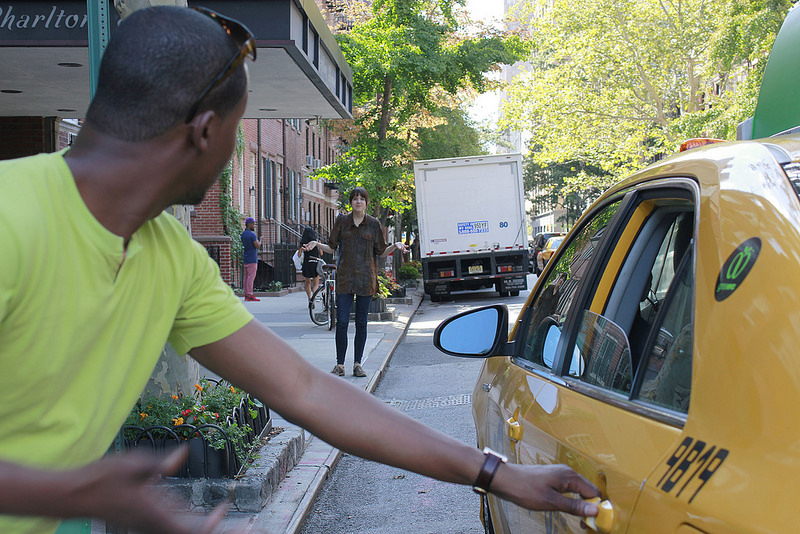January 17 is the day we celebrate the life and dream of Dr. Martin Luther King, Jr. This year is also the first year that we’re observing a national day of racial healing. We thought we’d take a minute to reflect on two recent studies that provide some strong statistical evidence for the unfortunate persistence of racial discrimination in transportation: “Driving while Black,” and discrimination in taxi hailing.
Driving While Black
“DWB.” Driving while black. Its a sad and scary fact of life in many communities in the United States. African-Americans are much more likely than other drivers to be pulled over for routine traffic infractions. Federal data on traffic stops show a clear difference by race: Black drivers are about 31 percent more likely to be pulled over for a traffic infraction than white drivers.
If you’re white, it might not be something you notice. In theory, it might be possible to discount this, if there were evidence that African-Americans were somehow more reckless than other drivers (not that we think that’s a plausible explanation). But a new analysis of travel data suggests that if anything, African-American drivers are significantly more cautious than others (an observation that is fully consistent with DWB).
The evidence comes–almost in passing–in a new paper on inter-metropolitan differences in transportation system performance entitled “Speed.” Written by economists Matthew Couture, Gilles Duranton, and Matthew Turner, it presents a systematic set of estimates of travel speeds in different metro areas. One of the complicating factors of speed estimation is that speeds vary by length of trip, time of day, and trip purpose. In general, shorter trips involve lower speed travel. That makes sense: if you’re just traveling a mile or two, especially between your home and some other destination, its likely you’ll travel mostly on local streets, with stop signs and traffic signals. But for longer trips, it makes more sense, even if its not the shortest distance, to travel part way on higher speed arterials or limited access freeways. Couture and his co-authors use detailed micro-data on trip taking in the National Household Transportation Survey to estimate variations in speed across metropolitan areas, after controlling for differences in trip distances and other demographic factors.
While its almost a footnote to the study, the author’s report the variations in driving speed according to a range of demographic characteristics. Some of their findings correspond with our stereotypes about driving behavior. Men drive faster than women. Older people drive more slowly. And as they note, race has a significant relationship with average driving speeds. From their report:
Women are about 0.5% slower than men. Age is more important. A year of age is associated with 0.3% slower speed. Black drivers drive about 8% slower.
Its interesting to compare the differences in driving behavior by age and race. If each year of age reduces your average speed by about three-tenths of one percent, that means that the typical black driver travels at about the same speed as a white driver who is about 26 years older. For example, a 25 year-old black driver would, according to these estimates, be expected to drive about as fast as a 51 year-old white driver.
These results are powerful evidence that DWB is real, that it affects driving behavior, and that the disparity in traffic stops is probably even greater than indicated by the gross statistics. Black drivers travel at speeds that are essentially the same as drivers that are a generation or more older than they. And if black drivers are going much more slowly, it seems like they ought to be less likely, all other things equal, to commit traffic infractions, than other drivers.
Discrimination in Taxi Hailing
Its a classic story of discrimination. A yellow taxi drives past an African-American whose arm is outstretched to hail a cab, and instead pulls in a few dozen feet further down the block to pick up a white fare. In theory, at least one of the advantages of transportation network companies–the computer-based ride-hailing services such as Lyft and Uber is that they should be more race blind. Indeed, there’ some evidence that these services have expanded for-hire transportation to neighborhoods that have often been under-served by traditional taxis.
But despite the technological advances, it appears that racial discrimination still persists. A new paper “Racial and Gender Discrimination in Transportation Network Companies,” from economists Yanbo Ge, Christopher R. Knittel, Don MacKenzie, Stephen Zoepf looks at discrimination by ride sharing services. The researchers constructed an extensive experiment using transportation network companies in Seattle and Boston. They sent a team of testers including men and women, Blacks and whites, to take about 1,500 rides in each city. They found found that drivers for ride-sharing services are prone to discriminate against African Americans, making blacks wait longer for rides when they can identify the race of the ride-hailer and more frequently cancelling rides when alerted to African American-sounding names.

In Seattle, blacks waited an average of 35 percent longer than whites. In Boston, they found that customers who had black-sounding names were about twice as likely to have their ride requests cancelled, compared to customers with white sounding names. There was also evidence of discrimination by gender as well: women tended to be taken on more circuitous–i.e. more expensive and profitable–routes to their destinations.
Conversations about race and discrimination are frequently made more difficult by the very different lived experiences of blacks and whites. For those who haven’t been discriminated against in a traffic stop or in trying to hail a taxi because of the paler shade of their skin, its hard to understand whether these experiences are real and commonplace. The data presented in these two studies is a quantitative reminder that it is still quite real.
